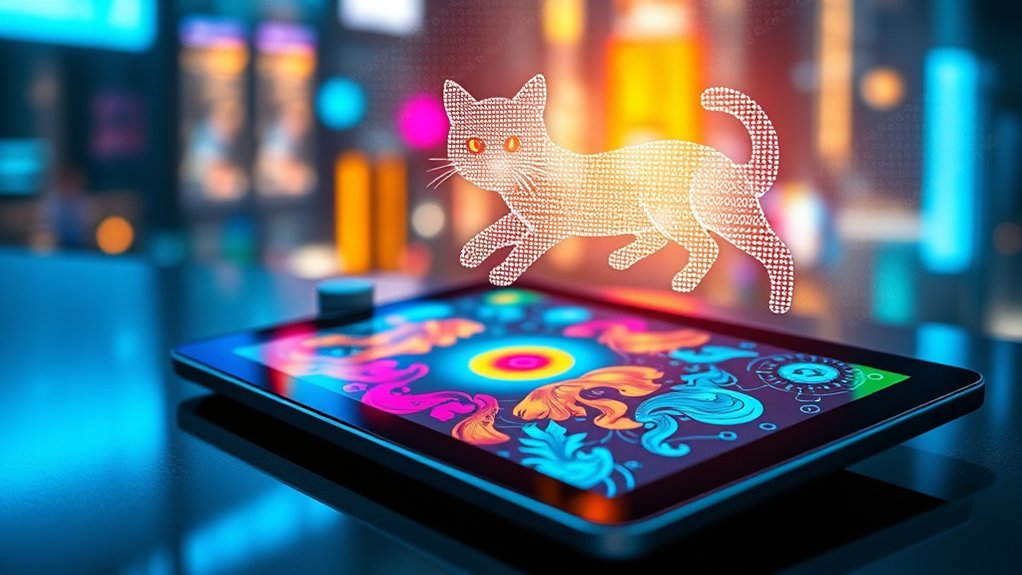Non-Fungible Tokens, or NFTs, are unique digital assets on a blockchain. They prove ownership and authenticity of various digital items, like art and virtual land. Unlike cryptocurrencies, they can't be swapped—each one is distinctive, like a digital fingerprint. The NFT market skyrocketed, only to crash hard later. Ownership doesn't equal intellectual property rights, though. It's a wild ride of speculation and creativity. But there's more to this chaotic world than meets the eye.

In a world where digital assets rule, Non-Fungible Tokens (NFTs) have emerged as the quirky, often baffling stars of the crypto universe. These unique digital identifiers are recorded on a blockchain, certifying ownership and authenticity like some kind of cosmic certificate.
But here's the kicker: unlike cryptocurrencies, NFTs are non-fungible. You can't swap them out like trading cards. They're one-of-a-kind and can't be copied or subdivided.
Anyone with a smidge of coding knowledge can jump in and create an NFT. They can represent everything from digital artworks to the latest cat meme. Yes, that's right. You can own a pixelated cat for a staggering price. Moreover, with the advent of Bitcoin Ordinals, NFTs can now be created directly on the Bitcoin blockchain, enhancing their accessibility and uniqueness.
Anyone with a hint of coding skill can dive into the NFT craze, minting everything from digital art to quirky cat memes.
NFTs utilize smart contracts to transfer ownership, ensuring that the transaction is recorded on a decentralized ledger. That means when you buy an NFT, it's not just a digital file; it's a unique asset you can trade on various platforms.
In the art world, NFTs are all the rage. Digital art, media, and even virtual real estate have found their way into this bizarre bazaar. Remember CryptoKitties? Yeah, that's what kicked off the NFT frenzy.
From a mere $82 million in 2020, NFT trading skyrocketed to a mind-boggling $17 billion in 2021. But hold your horses! The market crashed in 2022, plummeting over 90%. Talk about a rollercoaster ride!
Notably, Beeple's digital artwork sold for an eye-watering $69 million. But is it worth it? Some say it's speculative madness. Is it art? Is it a scam? The lines blur.
And while the ERC-721 standard allows for unique attributes in NFTs, it doesn't guarantee you any intellectual property rights. Additionally, NFTs can provide ownership and provenance of digital assets, offering new revenue streams for creators.
Frequently Asked Questions
How Do I Create My Own NFT?
Creating an NFT? It's not rocket science, but it has its steps.
First, whip up some digital content—art, music, whatever floats your boat.
Then, get cozy with a blockchain, probably Ethereum.
Set up a wallet to hold your crypto cash.
Mint your masterpiece by paying a gas fee—yep, that's the cost of doing business.
Finally, pick a marketplace to showcase your creation.
Easy, right? Welcome to the wild world of NFTs!
Can NFTS Be Used for Real Estate?
Yes, NFTs can absolutely shake up real estate. Imagine owning a piece of property as a digital token. Sounds wild, right?
Tokenization makes transactions smoother and cuts out the middlemen. Fractional ownership? Perfect for those who can't drop a fortune on a house.
And let's not forget blockchain's magic—secure and transparent ownership records. It's like buying a house with a magic wand.
But hey, regulations? Yeah, that's a whole other headache.
What Are the Environmental Impacts of NFTS?
NFTs pack a hefty environmental punch. Minting one can guzzle more electricity than a month's worth of your average home.
That's not just numbers; it's a carbon footprint that screams climate crisis. Most of these digital assets thrive on energy-sucking blockchains like Ethereum, which finally switched to a less wasteful model.
But hey, users still need to grapple with e-waste and rising emissions. Who knew owning digital art could leave such a messy trail?
How Do NFTS Differ From Cryptocurrencies?
NFTs and cryptocurrencies? Totally different beasts.
Cryptos are like cash—interchangeable, always the same. Think Bitcoin or Ethereum; one's just as good as another.
NFTs? They're one-of-a-kind. Each token is unique—like that weird painting your friend insists is "art."
While crypto moves fast, NFTs are a slow dance, often weighed down by gas fees.
Are NFTS Secure From Hacking or Fraud?
NFTs aren't exactly Fort Knox when it comes to security.
Sure, they're built on blockchain tech, but that doesn't mean hackers aren't lurking.
Phishing scams? Absolutely.
Fake projects? You bet.
And let's not forget the malware that sneaks in like a thief in the night.
Over $100 million worth of NFTs vanished in just a year.
So, while they can be cool, they're also a playground for fraudsters.
Proceed with caution!





